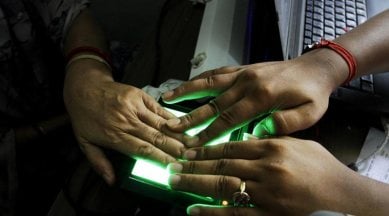Stay updated with the latest - Click here to follow us on Instagram
Surat PDS scam: To verify beneficiaries biometric data to be replaced with Aadhaar details
"Even if they bring Aadhaar data for verification, there is no mechanism to prevent Surat-like lapse. As the confidentiality of Aadhaar data is also questionable," an activits said.

After Surat Crime Branch arrested a software engineer and five others for the Public Distribution System (PDS) scam and alleged trading of biometric details of ration card holders to fraudulently lift food grains in their name and sell it off in the black market, the Civil Supplies department of Gujarat government is planning to replace its current biometric (fingerprint) database of beneficiaries with their Aadhaar data.
A senior officer from the Civil Supplies department who did not wish to be named said, “The general perception is that ration card shops are using Aadhaar card data of beneficiaries for verification which has been leaked. However, that is not correct. Gujarat had started issuing bar-coded ration cards in 2010 and since then we had collected fingerprint data of the beneficiaries by outsourcing the task to private agencies.”
“Now, with the issues like the one of leakage of fingerprint data in Surat, we are planning to replace the data with the Aadhaar data of the beneficiaries. We have already started it and it will be completed by March end,” the officer added. The officer admitted that leakage of fingerprint data cannot be ruled out as the task of collecting the same was given to private agencies around 2010-11. “However, the threat posed by the Surat scam can be plugged by replacing our biometric data with the Aadhaar data of the beneficiaries for verification as it is next to impossible to hack the Aadhaar database,” he added.
However, activists working in the field of food security say that the government’s move of replacing the biometric data with Aadhaar data for verification is just an eyewash and not a solution. Harinesh Pandya, an Ahmedabad-based RTI activist who also works in the field of food security, says, “That (replacing biometric data with Aadhaar data) certainly is not a solution of the problem. The thing is that personal data of beneficiaries has been leaked and the government has been caught napping. And even if they bring Aadhaar data for verification, there is no mechanism to prevent Surat-like lapse. As the confidentiality of Aadhaar data is also questionable.”
In Gujarat, there are around 1.27 crore ration cards, covering around 6.16 crore persons. On an average, each card has one or two family members’ fingerprint data collected by the Civil Supplies department. In Surat, the Crime Branch has arrested six persons, including a software engineer and two fair price shop owners, for using leaked biometric data of beneficiaries to lift subsidised foodgrains and sell it off in the black market. It came to light that ration was lifted from the cards of some prominent personalities, like local MP Darshana Jardosh. Following the Surat scam, activists working in the field of food security have alleged that the scam is state-wide and requires a thorough investigation.